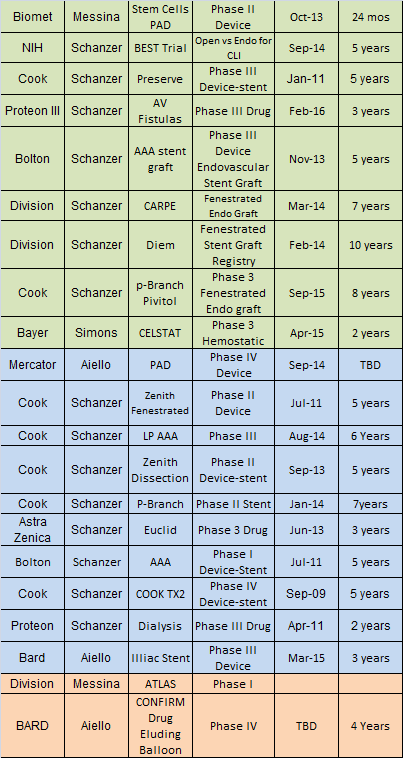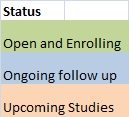Research
Vascular Research
Resident Research
We expect all of our residents to participate in research throughout training. Our residents have presented at many of our regional and national meetings (New England Society for Vascular Surgery, Society for Clinical Vascular Surgery, Society for Vascular Surgery Vascular Annual Meeting, etc). Our residents received the Darling Award for Excellence in Clinical Research two years in a row (2012 and 2013). They have first authored publications in major peer-reviewed journals including Journal of Vascular Surgery, Circulation, Annals of Vascular Surgery, and Vascular and Endovascular Surgery. In addition, our division sends our residents to several research conferences during training, including SCVS, NESVS, and SVS.
|
|
Basic science research
The Messina Vascular Research Laboratory was established in 2006 by Louis Messina, MD, who has enjoyed continuous extrinsic National Institutes of Health funding for 20 years. His current research program has two major areas of focus. One is an NIH-funded work to identify the cellular and molecular mechanisms that regulate collateral artery enlargement.
The second area of focus is how these effects of oxidant stress on hematopoietic and mesenchymal stem cells affect immunosurveillance against colorectal cancer and wound healing. The overarching result of these studies is that oxidant stress of stem cells is a critical regulator of innate immunity and inflammation. Three NIH RO-1 grants have been submitted this year.
Recent publications
- Fang ZB, Simons JP, Judelson DR, Arous EJ, Jones DW, Steppacher RC, Schanzer A, Aiello FA. Financial implications of coronavirus disease 2019 on a tertiary academic vascular surgery practice. J Vasc Surg. 2021 Jun;73(6):1869-1875.
- Duwayri YM, Woo K, Aiello FA, et al. The Society for Vascular Surgery Alternative Payment Model Task Force report on opportunities for value-based reimbursement in care for patients with peripheral artery disease. J Vasc Surg. 2021 Apr;73(4):1404-1413.e2.
- Simons JP, Crawford AS, Flanagan CP, Aiello FA, Arous EJ, Judelson DR, Messina LM, Robichaud DI, Valliere SA, Schanzer A. Evolution of fenestrated/branched endovascular aortic aneurysm repair complexity and outcomes at an organized center for the treatment of complex aortic disease. J Vasc Surg. 2021 Apr;73(4):1148-1155.e2.
- Oderich GS, Farber MA, Schneider D, Makaroun M, Sanchez LA, Schanzer A, et al. Zenith Fenestrated Study Investigators. Final 5-year results of the United States Zenith Fenestrated prospective multicenter study for juxtarenal abdominal aortic aneurysms. J Vasc Surg.Final 5-year results of the United States Zenith Fenestrated prospective multicenter study for juxtarenal abdominal aortic aneurysms. 2021 Apr;73(4):1128-1138.e2.
- Dalman RL, Murphy SA, AbuRahma AF, Calligaro KD, Dalsing MC, Eagleton MJ, Hodgson KJ, McDevitt DT, Reed AB, Schanzer A, et al. The Society for Vascular Surgery Executive Board response to the Diversity, Equity and Inclusion Taskforce Report. J Vasc Surg. 2021 Mar;73(3):757-761.
- De Guerre LEVM, Dansey K, Li C, Lu J, Patel PB, van Herwaarden JA, Jones DW, et al. Late outcomes after endovascular and open repair of large abdominal aortic aneurysms. J Vasc Surg. 2021 Mar 6:S0741-5214(21)00326-8.
- Cheng T, Boelitz K, Rybin D, Menard MT, Kalish J, Siracuse JJ, Farber A, Jones DW. Nationwide patterns in industry payments to academic vascular surgeons. J Vasc Surg. 2021 Feb;73(2):675-681.
- Duwayri YM, Aiello FA, et al. Defining the 90-day cost structure of lower extremity revascularization for alternative payment model assessment. J Vasc Surg. 2021 Feb;73(2):662-673.e3.
- Powell R, Brown K, Davies M, Hart J, Hsu J, Johnson B, Makaroun M, Schanzer A, et al. SVS Valuation Work Group. The value of the modern vascular surgeon to the health care system: A report from the Society for Vascular Surgery Valuation Work Group. J Vasc Surg. 2021 Feb;73(2):359-371.e3.
- Timaran CH, Oderich GS, Tenorio ER, Farber MA, Schneider DB, Schanzer A, et al. Aortic Research Consortium. Expanded Use of Preloaded Branched and Fenestrated Endografts for Endovascular Repair of Complex Aortic Aneurysms. Eur J Vasc Endovasc Surg. 2021 Feb;61(2):219-226.
- Flanagan CP, Crawford AS, Arous EJ, Aiello FA, Schanzer A, Simons JP. Preoperative functional status predicts 2-year mortality in patients undergoing fenestrated/branched endovascular aneurysm repair. J Vasc Surg. 2021 Feb 4:S0741-5214(21)00151-8.
- Arous EJ, Judelson DR, Agrawal A, Dundamadappa SK, Crawford AS, Malka KT, Simons JP, Schanzer A. Computed tomography angiography-derived area stenosis calculations overestimate degree of carotid stenosis compared with North American Symptomatic Carotid Endarterectomy Trial-derived diameter stenosis calculations. J Vasc Surg. 2021 Feb 3: S0741-5214(21)00136-1.
- Aucoin VJ, Eagleton MJ, Farber MA, Oderich GS, Schanzer A, et al. Spinal cord protection practices used during endovascular repair of complex aortic aneurysms by the U.S. Aortic Research Consortium. J Vasc Surg. Spinal cord protection practices used during endovascular repair of complex aortic aneurysms by the U.S. Aortic Research Consortium. 2021;73(1):323-330.
Clinical trials
We are pleased to participate in a number of clinical trials in collaboration with the Department of Surgery’s Center for Clinical Research and Trials. This allows us to offer cutting edge therapies for vascular conditions including complex aortic pathology; nonreconstructible critical limb ischemia; and hemodialysis access surgery for end-stage renal disease. Sponsorship of these trials is diverse, including the investigator, the National Institutes of Health, the Society for Vascular Surgery and industry leaders.


Clinical Outcomes Research
Our group has diverse areas of interest in clinical research, ranging from predictors of sac enlargement after endovascular aneurysm repair, national and regional variation in diagnosis and management of carotid disease, and risk stratification for lower extremity bypass and abdominal aortic aneurysm repair, to research on surgical education and training paradigms. Below is a list of recent peer-reviewed publications and descriptions of specific faculty research interests.
Faculty
Francesco A. Aiello, MD - recent publications
My research program has focused on the evaluation of the accuracy of the two main registries of vascular surgery procedures, the Vascular Surgery Quality Initiative and NISQP. With colleagues from the Department of Population & Quantitative Health Sciences including Drs. Amy Rosen and Bruce Barton, we have found to our surprise that neither registry provides an accurate measure of the outcome of vascular surgery procedures. Such registries are fundamental to determining the quality and effectiveness of such procedures. This work has been accepted for presentation at the New England Vascular Society of Vascular Surgery in September and we plan submission of a manuscript to the Journal of Vascular Surgery. In ongoing work we analyze the data to refine the analysis to shed more light on the sources of this inaccuracy. We hope to transition this work towards preliminary data for a K award.
Louis M. Messina, MD - recent publications
My current research program has two major areas of focus. One is on NIH-funded work to identify the cellular and molecular mechanisms that regulate collateral artery enlargement. We have shown that collateral artery enlargement is dependent on both hematopoietic and mesenchymal stem cells rather than as traditionally thought local tissue response by terminal differentiated cells in an ischemic environment. We have shown that oxidant stress by cardiovascular risk factors such as type 2 diabetes and hypercholesterolemia induce epigenetic changes that decreases the number and phenotype of terminally differentiated cells central to collateral artery enlargement such as monocytes. These epigenetic changes induce a higher proportion of pro-inflammatory monocytes than pro-angiogenic monocytes. These findings are generalizable. The second area of focus is how these effects of oxidant stress on hematopoietic and mesenchymal stem cells affect immunosurveillance against colorectal cancer and wound healing. The overarching result of these studies is that oxidant stress of stem cells is a critical regulator of innate immunity and inflammation. We plan to submit three NIH RO-1 grants this year.
Tammy T Nguyen, MD, PhD - recent publications
Dr. Tammy Nguyen’s research will focus on developing technologies to enhance wound healing, tissue perfusion and limb salvage. Specifically, she plans to leverage her training as a vascular surgeon (MD) and molecular biologist (PhD) to investigate the molecular mechanisms that compromise the immune system and inhibit wound healing in diabetes and limb threatening ischemia. Type 2 diabetes and atherosclerosis both present with innate immune dysfunction leading to reduced hematopoietic stem cell (HSC) mobilization and dysregulated differentiation towards monocytes-macrophages that are responsible for impaired diabetic wound healing. Currently, the mechanism to explain how diabetes leads to impaired HSC-mediated wound healing in patients is not completely understood. Using patient bone marrow and tissue samples, Dr. Nguyen will study the signaling pathways between adipocytes and HSC-mediated immune function that impairs wound healing in diabetes. Working closely with Drs. Messina (Vascular Surgery) and Corvera (Molecular Medicine), the goal of the lab is to accelerate understanding of non-healing diabetic foot ulcers and provide insight into therapeutic strategies by using patient samples to build a bedside-to-bench and bench-to-bedside translational research model.
Andres Schanzer, MD - recent publications
I have continued to pursue two major areas of research: the investigation of vascular surgery patient characteristics that predict major clinical outcomes using risk prediction modeling, and the evaluation of new endovascular technologies for the treatment of complex aortic pathology. I also continue to enjoy mentoring our vascular surgery residents on clinical outcomes research projects with the goal of ensuring that each trainee is involved with the design, implementation, presentation and publication of a clinical study. My current primary focus is running our FDA-approved, physician-sponsored investigational device exemption trial evaluating the safety and efficacy of custom-made devices and physician-modified endografts for the minimally invasive treatment of juxtarenal, pararenal and thoracoabdominal aortic aneurysms (CARPE-CMD study). We are currently enrolling patients and have been receiving a growing number of regional. Further details can be found on our Center for Complex Aortic Disease website.
Jessica P. Simons, MD, MPH - recent publications
The emphasis of my research is on methods of assessment of outcomes and quality for vascular disease. Specific current efforts are focused on lower extremity peripheral arterial disease, including a recent publication on the derivation and validation of a risk stratification model for amputation-free survival in patients undergoing lower extremity bypass for critical limb ischemia. It has been adopted for benchmarking by the Vascular Quality Initiative. I am also working to establish patient-reported outcomes as quality measures for claudication, with the intention that they may ultimately be routinely collected as part of larger registry efforts to establish the value of the care that we provide.
Messina Lab